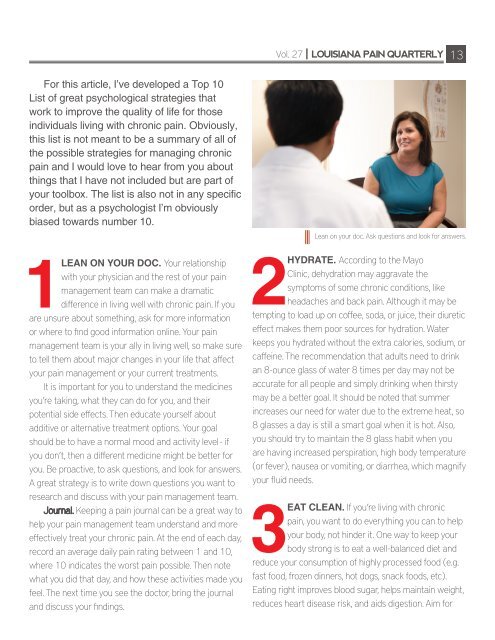LOUISIANA PAIN
LPQ-Summer-2016
LPQ-Summer-2016
You also want an ePaper? Increase the reach of your titles
YUMPU automatically turns print PDFs into web optimized ePapers that Google loves.
Vol. 27 <strong>LOUISIANA</strong> <strong>PAIN</strong> QUARTERLY 13<br />
For this article, I’ve developed a Top 10<br />
List of great psychological strategies that<br />
work to improve the quality of life for those<br />
individuals living with chronic pain. Obviously,<br />
this list is not meant to be a summary of all of<br />
the possible strategies for managing chronic<br />
pain and I would love to hear from you about<br />
things that I have not included but are part of<br />
your toolbox. The list is also not in any specific<br />
order, but as a psychologist I’m obviously<br />
biased towards number 10.<br />
1LEAN ON YOUR DOC. Your relationship<br />
with your physician and the rest of your pain<br />
management team can make a dramatic<br />
difference in living well with chronic pain. If you<br />
are unsure about something, ask for more information<br />
or where to find good information online. Your pain<br />
management team is your ally in living well, so make sure<br />
to tell them about major changes in your life that affect<br />
your pain management or your current treatments.<br />
It is important for you to understand the medicines<br />
you’re taking, what they can do for you, and their<br />
potential side effects. Then educate yourself about<br />
additive or alternative treatment options. Your goal<br />
should be to have a normal mood and activity level - if<br />
you don’t, then a different medicine might be better for<br />
you. Be proactive, to ask questions, and look for answers.<br />
A great strategy is to write down questions you want to<br />
research and discuss with your pain management team.<br />
Keeping a pain journal can be a great way to<br />
help your pain management team understand and more<br />
effectively treat your chronic pain. At the end of each day,<br />
record an average daily pain rating between 1 and 10,<br />
where 10 indicates the worst pain possible. Then note<br />
what you did that day, and how these activities made you<br />
feel. The next time you see the doctor, bring the journal<br />
and discuss your findings.<br />
Lean on your doc. Ask questions and look for answers.<br />
2<br />
HYDRATE. According to the Mayo<br />
Clinic, dehydration may aggravate the<br />
symptoms of some chronic conditions, like<br />
headaches and back pain. Although it may be<br />
tempting to load up on coffee, soda, or juice, their diuretic<br />
effect makes them poor sources for hydration. Water<br />
keeps you hydrated without the extra calories, sodium, or<br />
caffeine. The recommendation that adults need to drink<br />
an 8-ounce glass of water 8 times per day may not be<br />
accurate for all people and simply drinking when thirsty<br />
may be a better goal. It should be noted that summer<br />
increases our need for water due to the extreme heat, so<br />
8 glasses a day is still a smart goal when it is hot. Also,<br />
you should try to maintain the 8 glass habit when you<br />
are having increased perspiration, high body temperature<br />
(or fever), nausea or vomiting, or diarrhea, which magnify<br />
your fluid needs.<br />
3EAT CLEAN. If you’re living with chronic<br />
pain, you want to do everything you can to help<br />
your body, not hinder it. One way to keep your<br />
body strong is to eat a well-balanced diet and<br />
reduce your consumption of highly processed food (e.g.<br />
fast food, frozen dinners, hot dogs, snack foods, etc).<br />
Eating right improves blood sugar, helps maintain weight,<br />
reduces heart disease risk, and aids digestion. Aim for


